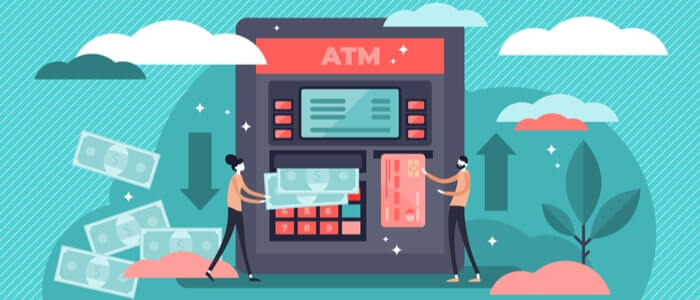The Risks of Withdrawing Too Much Cash During a Crisis
In times of uncertainty caused by natural disasters, people wonder how safe their money is in a bank. Weather-related events like earthquakes, hurricanes, and snowstorms can block roads and cause power outages, driving a temporary need for extra pocket money. During a public health emergency, however, needs are different. In fact, taking too much cash out of the bank may put you at risk of loss. In a bank, your money is insured. At home, it is not.
How do the FDIC and the NCUA protect my money?
In the 1920s and early 1930s, the Great Depression caused a financial panic. It was not uncommon for people to worry about losing money to a bank closure during times of insecurity. So, in 1933, the federal government stepped up to ensure bank account security. They created the Federal Deposit Insurance Corporation (FDIC) for commercial banks and the National Credit Union Administration (NCUA) for credit unions a year later. Both agencies insure accounts up to $250,000. Today, the NCUA insures $1.38 trillion worth of assets and manages receiverships should banks fail.
Since 1934, nobody has lost a dollar at a federally insured credit union. The same cannot be said for people with stockpiles of cash at home where a theft, fire, or flood can wipe out a lifetime of savings.
WSECU (Washington State Employees Credit Union) has been operating since 1957 and is federally insured.
Most people don’t need cash
Credit union members have access to accounts in ways people in the 1920s could not imagine. Writing checks, paying loans, and paying bills online has never been easier. By setting up recurring transfers to phone, cable, utility, and mortgage companies, cash is unnecessary. You don’t have to step outside your home to pay, remember due dates, or risk missed payments.
A debit card linked to a checking or savings account reduces the need for cash at most retail outlets outside the home. Unlike with credit cards, you cannot spend more money than you have with a debit card. There is no need to pay a bill at the end of every month, so there is no risk of having late payments. There is no application or credit check needed as long as you have a checking account, and fees are much lower compared to credit cards.
Debit cards also offer theft protection. Let your bank know your card is missing or stolen, and you will not be responsible for subsequent charges. If you see suspicious charges to your account, let your bank know within 48 hours, and you’ll be responsible for, at most, $50.
Money in the bank may still earn interest
Interest rates are at historic lows, but that doesn’t mean money in the bank earns no interest at all. Check with your bank or credit union to see if your account is interest-bearing. Users may still earn money by keeping their money in a bank account. The same cannot be said for the money in a pocket or under a mattress.
Cash is expensive
It’s difficult to keep track of cash, especially when you aren’t used to having it on your person and accounting for it every day. In times of stress and isolation, it becomes easy to spend money every time you go out. Having cash with you makes it easy to access and spend on non-essentials and extras at the grocery store or supercenter.
Figures for the 9 million Americans who are unbanked–who deal only in cash–show the impact of using only cash. They spend an average of $200 yearly on costly check cashing and money order services and are six times more likely to use check cashing and bill pay services. The aggregate cost to them is between $2-4 billion dollars annually.
ATM fees can add up for people withdrawing cash. Bank customers need to make certain the machine is in their own bank’s network.
Cash is not clean
Even before the COVID-19 epidemic, the Centers for Disease Control and Prevention recommended washing hands after handling cash. Bacteria, viruses, yeast, and mold cling to cash, often passed through droplets on hands. Banks in China have been disinfecting cash and the WHO raised concerns that dirty banknotes may contribute to disease spread.
With hand washing and personal hygiene, leading the news, contactless payment systems are the best alternative. Many credit and debit cards are chip-enabled to be tapped on a reader in a store. Apple and Android phones that are NFC-capable can take advantage of Apple Pay and Android Pay systems, allowing customers to link their debit or credit cards and use their phones to pay for items at a merchant’s credit card terminal. Using a credit card the old-fashioned way, by swiping or inserting, is still safer than handing paper money and passing it from person-to-person.
If you do withdraw cash, make certain to wash or sanitize your hands not only after handling or using it but after using an ATM. Banks are taking extra care to clean common surfaces and ATM screens, but be proactive.
Summing-up
Every disaster is different. While it may feel that withdrawing money is the right thing to do, it is safer in the bank. Unlike in the economic downturn of 2008, there is no banking crisis right now. There are no infrastructure problems, like transportation or utility shortages. Banks and the banking system are operable and in good shape, and the FDIC and NCUA insures customers’ money.
Cash, in contrast, is risky. It is easy to spend, easy to lose, uninsured, and doesn’t earn interest. The notes themselves can be unclean and potentially harbor disease as they pass from person-to-person in high-volume stores. ATMs may be unclean. The safest and best payment option is a contactless credit or debit card, which requires no person-to-person handling.

